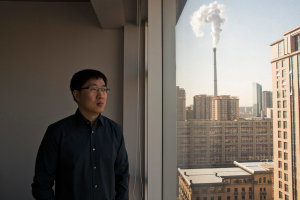By EDWARD WONG FEB. 13, 2015
Wang Qinglei, a former producer who worked at China Central Television, or CCTV, from 2003 until he was fired in 2013 for publicly denouncing propaganda on the network, at his new office in Beijing. Credit The New York Times
BEIJING — As President Xi Jinping accelerated his sweeping campaign against government corruption, political enemies and Western influences in China, he deployed the Communist Party’s most powerful propaganda tool, the state television network, like a hammer.
News programs on the network, China Central Television, showed confessions by prominent businessmen before they had even been put on trial. Foreign companies like Apple were smeared by so-called investigations programs. Heavily edited excerpts from the trial of a fallen party leader were broadcast in prime time to hundreds of millions of viewers.
But now the wrath of the party has turned on the network itself. An inquiry into corruption at CCTV, as the network is known, has shaken up the nation’s most influential news and propaganda organization, riveting the country with reports involving a seamy mix of celebrities, sex and bribery.
At least 15 senior network employees have disappeared into the maw of party and state detention, according to official news reports and people who have been tracking the investigations. The most famous, Rui Chenggang, 37, a smooth-talking financial news anchor who wore Italian suits and drove a Jaguar, was noticeably absent last month from the annual conference of the World Economic Forum at Davos, Switzerland, where he had been a fixture for years.
The network’s more than 10,000 employees are on edge. The practice of trading positive coverage for cash is so prevalent, many say, that everyone lives in fear that employees who have been detained will reveal details about their colleagues. Like others for this article, they spoke on the condition of anonymity for fear of retribution from the authorities for talking about the continuing investigations.
Managers hesitate to make big decisions. The move into the new landmark CCTV headquarters, which has been mostly empty since its facade was completed in 2008, has stalled, and some high-budget documentary projects have been frozen.

